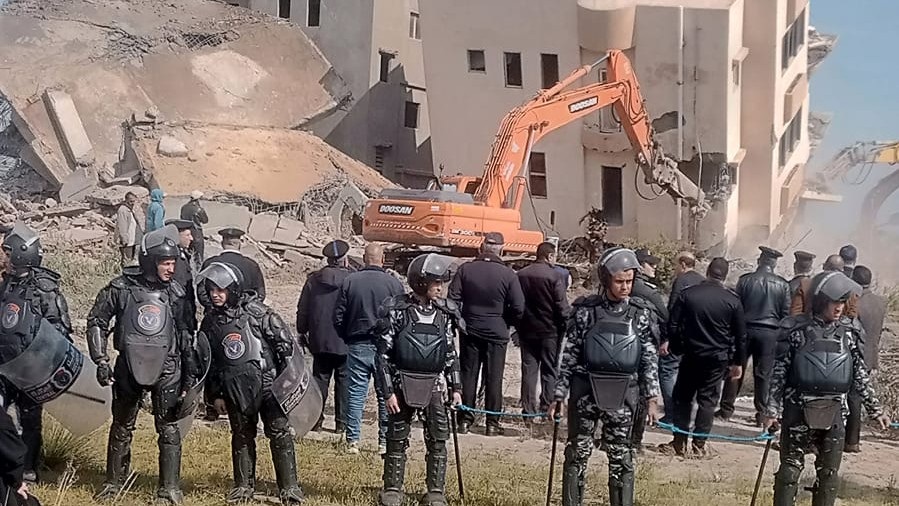Forced Eviction and Demolition: Egypt’s Controversial Development Tactics

Watan-According to a report by Middle East Eye, the Egyptian government resorted to cutting off electricity and water, and terminating contracts in order to forcibly evacuate the suburb of Al-Jamil located west of Port Said governorate in the northeast of the country, to pave the way for investments in that prime land on the seaside.
The report added that Port Said Governor Adel Al-Ghadban defended the demolition of Al-Jamil neighborhood, considering it within development plans, but residents and legal experts had a different story to tell.
-
From Gaza to Egypt: The Ongoing Struggles of Palestinian RefugeesJanuary 23, 2025
-
Sisi’s Worries Intensify Following Assad’s DownfallJanuary 21, 2025
The report quoted Egyptian citizen Rajaa Mahrum Ali, a radiology specialist, who stood on the upper floor of her house watching as bulldozers demolished it one balcony after another, saying, “I can’t believe I’m still alive. The house could have collapsed, and I would have died.”
“Rajaa” is one of hundreds of residents in the Al-Jamil suburb of Port Said city whose homes have been destroyed or are awaiting imminent demolition to pave the way for investments in that prime land on the seaside.
The report explained that demolition work began in early February and is still ongoing.
Demolition of 290 homes and the plan continues
Residents told the British website that 290 homes have been demolished so far, while about 25 homes are still awaiting the same fate for their owners.
Al-Jamil suburb was built in the west of Port Said in 1978 when the government allocated 317 plots of land directly on the Mediterranean coast, according to the Al-Jamil Suburb Association for Environmental Protection and Development.
Suburb residents built their homes on these lands with their own money, with government permission, and under a leasehold contract.
The residents cooperated among themselves to provide utilities at their own expense without government support, according to statements by three residents to the British website.
The situation remained stable for about four decades until 2019 when the Port Said governorate announced the termination of land lease contracts and refused to accept the fixed annual payments from residents.

Commencement of demolition operations
Human rights organizations and residents said the decision to terminate the contracts was made unilaterally without consulting the residents. Demolition operations were carried out despite demands from members of parliament to explore alternative solutions.
The British website obtained copies of three statements submitted by parliamentarians to the government, calling for an immediate halt to demolition activities.
The MPs also called for consideration of alternative proposals from residents, including their readiness to buy the land at fair market prices.
Illegal steps
Maha Ahmed, a human rights lawyer at the Egyptian Commission for Rights and Freedoms, said that the residents of Al-Jamil suburb were subjected to “illegal forced evictions.”
Article 63 of the constitution prohibits any form of forced displacement of citizens and considers it a criminal offense that does not expire. She added that the demolition operations constitute a violation of Egypt’s obligations under international law.
The Supreme Council for Planning and Urban Development approved in December 2020 the declaration of Al-Jamil suburb in Port Said as a “replanning area.”
Under Article 47 of the Urban Planning Law No. 3 of 1982, this means that properties in the area will be demolished for development and public benefit purposes, with compensation provided to property owners and rights holders. However, this has not happened, and no one has received compensation.
The conditions of the leasehold contracts stipulate that the government must pay compensation in the event of contract termination. However, officials did not offer any compensation for the loss of their homes.
Some suburb residents turned to the Egyptian judiciary as a last resort to obtain their rights stipulated in leasehold contracts.
A lawyer representing several residents, speaking on condition of anonymity, said that starting demolition without compensation is a violation of civil law and specifically Article 925. He stressed that the state is obligated to compensate property owners as long as it allowed construction and issued permits.
While some displaced residents mentioned that they filed a lawsuit in administrative court, they have not received a response from the court yet. They have now taken the case to the Supreme Administrative Court.
Government tactics to demolish homes
Residents said the government used several tactics to demolish homes while residents were inside to force them out, including deliberate cutting of electricity and water.
A mother of a three-year-old child, who preferred not to reveal her identity, said her husband was detained for 24 hours to compel them to leave the house.
She added, “His detention sent a clear message that we would be forcibly evicted if we did not leave the house voluntarily.”
They were not informed of any compensations, she said, but one contractor talked to them about getting compensation ranging from 40,000 to 80,000 Egyptian pounds (approximately $850 to $1,700). She explained that this amount is “not fair at all.”
Another resident, aged 42, said, “They asked us to leave the house for a short period for a conversation, but during our dialogue and our request for papers proving the demolition decision and eviction order, we were shocked to see excavators demolishing part of our villa.”






